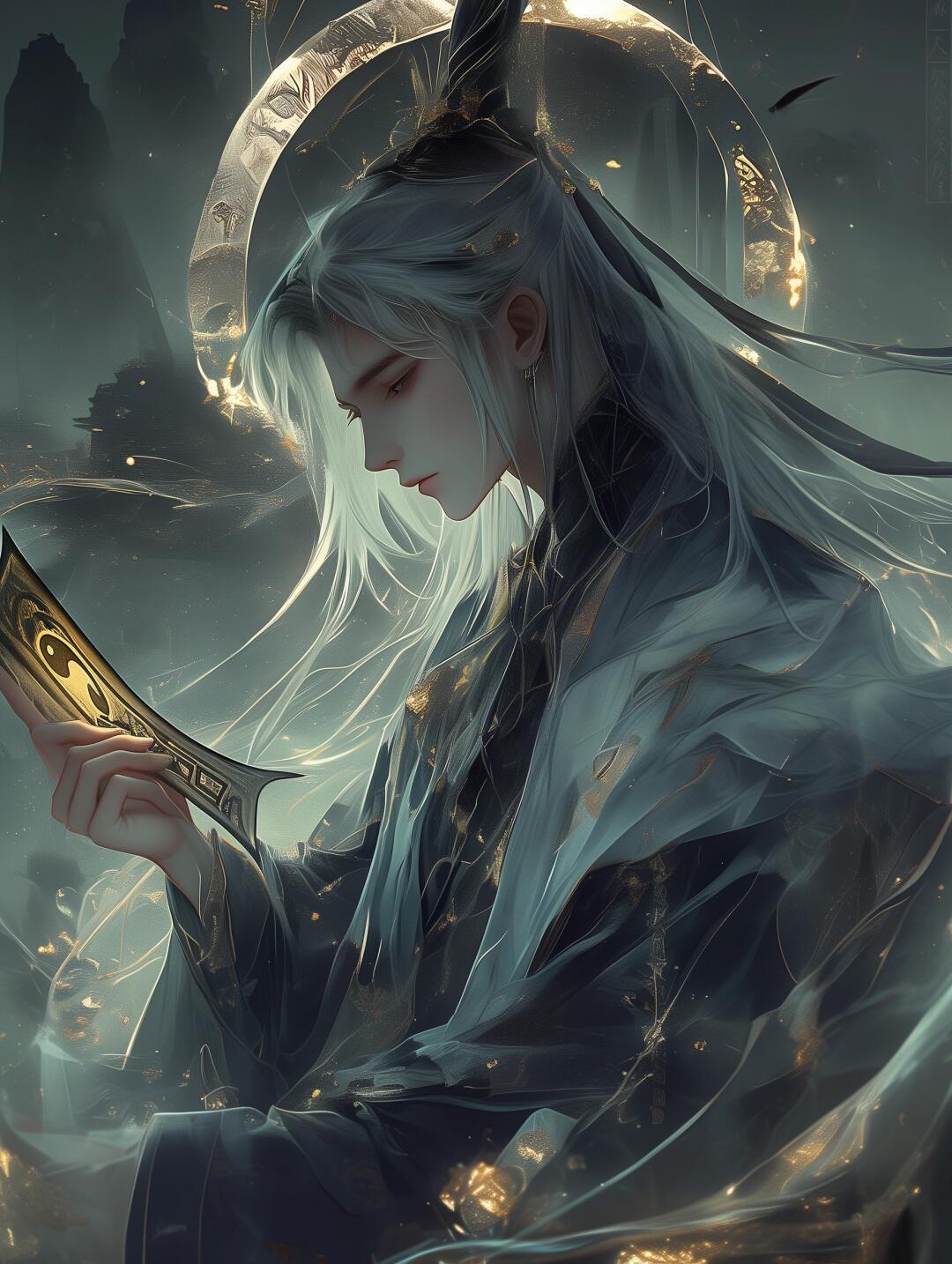In the heart of a small town, nestled between the mountains and rivers of ancient China, there lived a young merchant named Zhang Liang. Ambitious yet earnest, Zhang Liang had built a modest fortune selling fine silks, tea, and porcelain. Despite his success in business, he often felt a sense of restlessness, as though something was missing in his life—a deeper connection to the world around him. His nights were frequently spent in solitude, pondering the true meaning of wealth, success, and inner peace.
One day, Zhang Liang came across an old scroll depicting Daoist philosophy. He had always admired the teachings of Daoism for its emphasis on balance, simplicity, and spiritual cultivation. As he read, he came across a passage that spoke of golden silk nanmu wood (金丝楠木) and its unique significance in Daoist culture. The text mentioned that this precious wood, revered for its sacred qualities, was often used to create exquisite ritual objects, furniture, and carvings that were believed to enhance spiritual energy, protect against negative influences, and promote harmony in one’s environment.
Intrigued, Zhang Liang decided to seek out a master craftsman who could create a piece of nanmu woodwork that could bring peace and balance to his life. He had heard of a legendary artisan named Master Li, known far and wide for his skill in working with precious materials, especially golden silk nanmu. Master Li’s workshop was located on the outskirts of the town, a humble yet picturesque establishment surrounded by ancient trees and flowers.
The Encounter with Master Li
Zhang Liang arrived at Master Li's workshop, where the air was thick with the scent of wood shavings and incense. The walls of the workshop were lined with stunning works of art—jade sculptures, wooden carvings, and elegant furniture. But what caught Zhang Liang's eye was a large piece in the center of the room—a finely crafted Eight Immortals Table (八仙桌), made entirely from golden silk nanmu wood. The table was like no other Zhang Liang had ever seen. It seemed to glow with an ethereal light, as if infused with a divine presence.
Master Li, a man of advanced years with deep wrinkles and kind eyes, noticed Zhang Liang’s gaze. He smiled warmly and gestured for him to approach. "This piece," Master Li said, his voice soft and deliberate, "is a creation that embodies the spirit of Daoism. It is carved from the finest golden silk nanmu, a wood believed to have been blessed by the gods themselves. The carvings on this table depict the Eight Immortals Crossing the Sea—a story from Daoist legend that symbolizes the triumph of wisdom and virtue over adversity."
Zhang Liang marveled at the intricate details. The table’s surface was covered with scenes of the Eight Immortals—each immortal was uniquely portrayed, holding their respective symbolic items, as they sailed across turbulent waves on the backs of various animals and magical creatures. The carving was so life-like that the figures seemed to move and change with the light. Each stroke of the chisel had captured not only the physical likeness of the immortals but also the very essence of their spirits.
Master Li continued, "Golden silk nanmu is not just beautiful—it is a material with great spiritual power. In Daoist belief, it carries the energy of the universe, drawing in good fortune and dispelling negative influences. It is said that when a person sits before a piece of art crafted from this wood, they can feel a sense of inner calm and clarity. It is a perfect companion for those seeking balance in their lives."
Zhang Liang, deeply moved by both the beauty and spiritual significance of the table, felt an immediate connection. It was as if the piece resonated with a part of him that he had long neglected—the longing for peace, wisdom, and spiritual connection. Without hesitation, he asked Master Li, "How much for this table? I would like to purchase it."
Master Li raised an eyebrow, as if to gauge the sincerity of Zhang Liang’s request. "This table is not just a piece of furniture, young merchant. It is an investment in your spiritual well-being. Are you prepared to welcome its power into your life? It will not simply enhance your surroundings—it will change the way you see the world."
Zhang Liang, eager to embrace this new path, nodded confidently. "I am ready, Master."
The Spiritual Significance of Golden Silk Nanmu Wood
Master Li carefully wrapped the table, ensuring that it would be transported with the utmost care. As Zhang Liang made the journey back to his home, his thoughts were filled with excitement and curiosity. What would it be like to have such a powerful object in his presence every day? Would it truly bring him the peace and clarity he sought?
The golden silk nanmu (金丝楠木) itself is a rare and precious wood found in the ancient forests of China. Its name comes from the fine, golden streaks that run through the wood, giving it a unique and radiant appearance. In Daoist belief, nanmu wood is said to be imbued with the natural energy of the universe, or Qi, which makes it an ideal material for crafting ritual objects, amulets, and furniture. The wood is believed to possess protective properties, guarding against misfortune and enhancing the spiritual energy of its surroundings. For centuries, Daoists have used this wood in sacred spaces and temples, where it is thought to draw positive energy and promote harmony between humans and the natural world.
In Daoist thought, the Eight Immortals (八仙) are symbolic figures of wisdom, longevity, and virtue. Their story is one of transcendence and enlightenment, as they use their magical powers to help those in need and overcome obstacles. The carving of the Eight Immortals on Zhang Liang’s new table was not just an aesthetic choice—it was a reminder of the qualities that Zhang Liang needed to cultivate in his own life: resilience, humility, and a deep connection to the natural forces that govern the universe.
Daoism teaches that balance is key to achieving harmony in life. The universe operates on the principle of Yin and Yang, where opposites exist in harmony and complement each other. By cultivating inner peace, practicing mindfulness, and staying aligned with the flow of nature, individuals can tap into this universal energy, bringing peace and abundance into their lives. Golden silk nanmu wood, with its deep connection to the earth and the heavens, served as a powerful tool to help Zhang Liang reconnect with the natural rhythms of life.
A New Beginning
Upon arriving home, Zhang Liang placed the Eight Immortals Table in his study, right next to his desk. The moment he sat down at the table, he felt a subtle shift in the atmosphere. The room seemed to grow quieter, the air more serene. As he meditated, he could sense a steady flow of energy emanating from the table. It was as though the very essence of the Eight Immortals had come to life, surrounding him with their wisdom and strength.
Every morning, Zhang Liang would sit before the table and meditate, allowing the peaceful energy of the wood to calm his mind and center his thoughts. As he spent more time in this quiet reflection, he began to notice subtle changes in his life. His business, which had once been unpredictable, began to stabilize. He found himself making wise decisions, and his relationships with friends and family grew stronger. The stress and anxiety that had once clouded his judgment began to dissipate, replaced by a sense of clarity and purpose.
Over time, Zhang Liang came to understand the deeper lesson that Daoism teaches: that true wealth is not measured by material possessions, but by the richness of one’s inner life. The golden silk nanmu table had not only transformed his home but also his heart. It had helped him cultivate peace, balance, and wisdom, qualities that he now recognized were the true sources of lasting happiness.
One day, as he sat at the table, deep in thought, Zhang Liang reflected on the journey he had undertaken. He had come to understand that his pursuit of material success, while important, had been incomplete without spiritual growth. The table, carved with the image of the Eight Immortals, had guided him to a deeper understanding of Daoism, showing him that true fulfillment comes from living in harmony with the universe.
Conclusion: Harmony Through Craftsmanship and Daoism
In the years that followed, Zhang Liang became known not only as a successful merchant but also as a wise and peaceful man. His business continued to thrive, but his greatest treasure was the inner peace he had cultivated through his practice of Daoist philosophy and his connection to the spiritual power of the golden silk nanmu wood. His study, where the Eight Immortals table stood as a silent witness to his journey, became a sanctuary of wisdom and serenity.
Master Li’s craftsmanship had not only provided him with a beautiful object but had given him a tool to navigate the complexities of life, drawing on the eternal wisdom of the Dao. And so, Zhang Liang lived his life, always mindful of the balance between the material world and the spiritual realm, knowing that true success lies in the harmony between the two.



